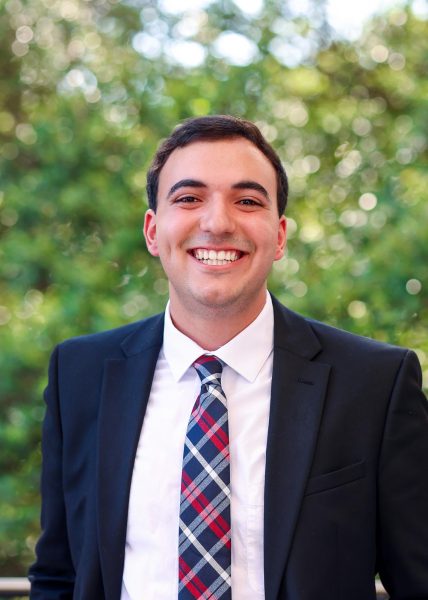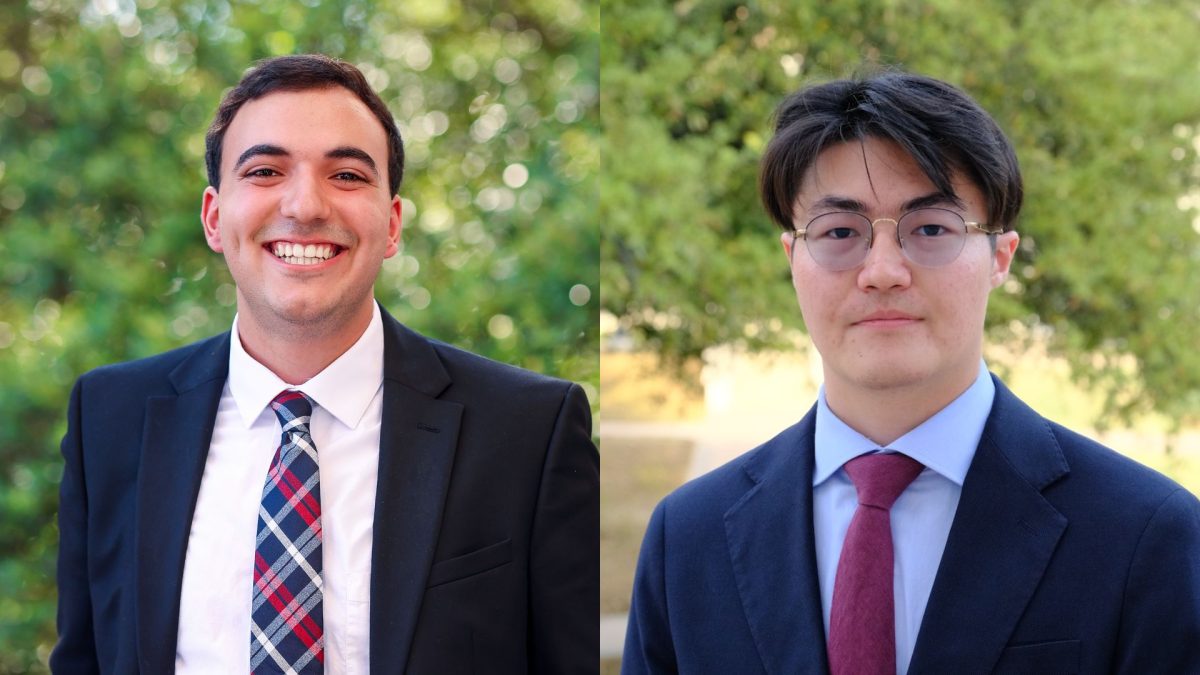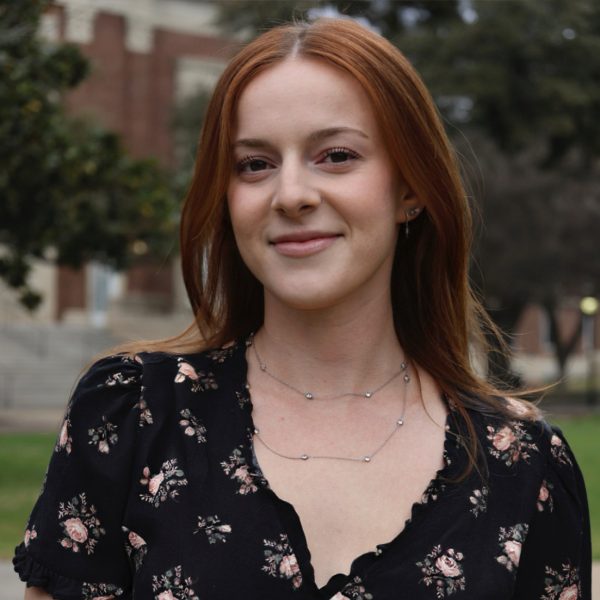At the beginning of last semester when The Daily Campus began its video segment, “Student Senate in a Minute,” our staff recalled senator campaigns that hoped to foster transparency. Many candidates cited student news organizations, like The Daily Campus, as a way to act on that campaign promise.
Through “Student Senate in a Minute,” reporters with The Daily Campus provide students, who may be unfamiliar with Student Senate proceedings, with a look at what happens every Tuesday afternoon in the Senate’s chamber. This election season, The Daily Campus hopes to build on that impactful reporting, spurring a more conscious campus who feels kinship with their student representatives.
In the past, The Daily Campus operated like other newsrooms, giving their own endorsements for Student Senate elections. David Huntley, who spoke at this year’s Black Excellence Ball and served as SMU’s first Black student body president from 1978 to 1979, recalled his endorsement from The Daily Campus. Our staff discussed the logistics of restarting newspaper endorsements, ultimately deciding it may pose a conflict of interest.
While The Daily Campus has chosen to forego endorsements, we do not give up on our dedication to transparency in our reporting. Our Senate Elections Board, composed of Katie Bergelin (Editor-in-Chief) , Melanie Jackson (Managing Editor), LuLu Garnett (Newsletter/Copy Editor), Camila Trevino (Social Media Editor) and Darcy Bass (General Assignment Reporter), sat down with candidates running for treasurer. Both candidates received the same set of questions and gave the following answers.

Byoung Lee
Rising junior, studying political science, public policy, business analytics and supply chain management
Daily Campus: What’s one initiative you’ve pursued during your time in Senate? How does that initiative impact students or how will it impact students?
Byoung Lee: I’ve been on Student Senate for two years. I’ve been on the finance committee for two years, and the vice chairman as well for this year. I’d say one of the biggest things that I’ve worked on would be the budget reform bill that I’ve co-authored. We passed that last month and I think that’s one of the more impactful things I’ve done. I’ve been able to give more financial freedom to clubs, make it so that we removed some bureaucratic inefficiencies, because instead of every single club, [talking to Senate] when they want to reallocate money to their budget, now we give it to y’all and y’all can spend it wisely in our standards. I’m also the director of civic engagement, so I was also trying to get people to vote during election season. We got 172 people to vote. I’d say that was a pretty good turnaround.
DC: What’s one group or area of campus you feel needs more representation and how will you bring them into the conversation?
Lee: I think every single organization on campus, every single group is important. They all have a critical role. Every single club brings value. I think that whether you’re a service-based organization, whether it’s a competition-based club, I think that it’s important that we provide every single club [funding for] whatever event they have. Whatever competition or conference that they’re trying to expand on, we fund them so that they can keep on promoting SMU’s name.
DC: What’s one faculty relationship you’ve honed during your time in Senate and how has that relationship benefitted you in your time in Senate?
Lee: I always talk with Sean Murphy. He’s the faculty adviser for Senate. He’s pretty resourceful. He’s helped me with problems in Senate whenever we have hiccups. Outside of Senate, also, he’s been very chill. The comptroller last year also was very chill for the finance committee. He was always great to work with on the finance committee.
DC: What specific policies or initiatives do you plan to introduce if elected?
Lee: The budget reform bill that we’ve co-authored and passed, I want to make sure that that runs smoothly, keep on implementing it and make sure that clubs understand the new system, so that there’s no confusion. If there is, I’m always going to be there. I think it’s important to have a treasurer that’s connected with the community, with all the clubs, that goes to their events and is able to communicate with them if there’s any issues. I definitely want to make sure that the new budget system that we put in place can continue to run smoothly.
Another initiative I want to focus on is having the school, or other departments, fund certain events as well. Currently, certain departments, whether it’s admissions or orientation, they take advantage of events that student campus organizations throw, yet they don’t chip in, they don’t invest, they don’t provide monetary support. I feel like that’s an issue because student tuition fees are what fund Student Senate, which fund organizations. I feel like it’s important to have these organizations have a little more support from the school from different areas. I feel like that’s something that is not just the treasurer, but it has to have a good connection with all the other clubs so that we can have a united front to pry the school’s hand.
DC: Besides The Daily Campus’ initiatives to show what goes on within the Senate chamber, how do you plan to keep students informed about Senate decisions and initiatives?
Lee: I feel like this year we’ve been way better with providing information to people. We’ve invited The Daily Campus, of course, the weekly minute is always great. I feel that can always be expanded. Maybe we can offer to give you all the slides as well or the snippets of them. I feel like that’s always good to just get people information. The only available information that we publish is the minutes, which is pretty helpful but I feel like we don’t post the slides on them sometimes, which have officer reports and the stuff that we pass. I would definitely want to make sure that we keep on having the website, keep on updating it and perhaps even publishing more information officially. Inviting more boards to come in, because our chambers are open to everyone. I don’t know if people realize that. I feel like people need to know that y’all can come in. We can yield time to y’all also, if you want to talk, so I feel like that’s important to have.

Owen Bartosh
A rising sophomore double majoring in marketing and public policy.
Daily Campus: What’s one initiative you’ve pursued during your time in Senate? How does that initiative impact students or how will it impact students?
Owen Bartosh: One of the things I am most proud of is, having only been in Senate for one year, I’ve authored or co-authored three pieces of legislation and a proclamation. But the thing I’m most proud of working in Senate was being able to co-author and help write a brand new process to help student organizations with the budget. We created an entirely new process for the budgeting of our $1.2 million to student organizations. What it essentially does now is it allows student organizations, instead of having to plan out their events a year in advance, line by line, we are using their attendance numbers and different metrics to give them a lump sum of money. We say, ‘Here’s your budget. You spend it however you feel best suits your needs for your particular student organization.’ We’ve got a lot of great responses from the leaders of student organizations, particularly cultural organizations. They have thought it’s been great because it’s really hard to budget those big events a year out when you don’t know how much you’ll need of each item.
Additionally, I authored by myself a pretty significant change to the internal bylaws in the Student Senate. Previously, only the membership chair could introduce amendments to the Senate election code. However, we found there were some difficulties with getting a membership chair on board, even though there were ideas that the entire chamber wanted, if the membership chair said ‘No, we don’t want that to change,’ it wasn’t going to change. I authored a piece of legislation that allows any member of the chamber to introduce an amendment to the election code, and it can pass after a two thirds majority vote of approval. The real initiative behind that was to democratize access to that election code while also maintaining the integrity of the document, and it allows duly elected senators to have a voice to make sure that our elections are as fair as we possibly can have them.
I also co-authored the bill that sent out the survey to see if the student body wants to have digital IDs. My name was on that bill and we are waiting on our responses to get back right now, but we’re very excited to move forward in that process. The proclamation I helped write was the week before the ACC Championship. It was Clemson Hate Week, is what we officially said that that week was, and I had a lot of fun writing that. I would say, across all of my initiatives in Senate, it’s really been to foster equal access for everyone, that no matter what school you come from, whether you come from Meadows or Simmons or wherever, you have power as a duly elected member of the Senate to enact change and that’s what I’ve been really trying to to do.
DC: What’s one group or area of campus you feel needs more representation and how will you bring them into the conversation?
Bartosh: Absolutely, I think we all can see right now, in the current times we live in, that our cultural organizations really need to have the funding and the space on campus to share their messages and share their ideas. We’re right now in the middle of passing the budget and one thing that I’ve really been an advocate for is increasing how much of the budget we give to those cultural organizations. I think they host some of the most creative events. Their events have some of the highest attendance so it’s easy to justify giving them a lot of money, but I think especially now, that’s the group that I would say needs to have the support in order to really hold those events and really do justice to what they represent.
DC: What’s one faculty relationship you’ve honed during your time in Senate and how has that relationship benefitted you in your time in Senate?
Bartosh: Dr Bruce Levy. He is an English professor. We talk almost every week about what I’m doing in Senate. He teaches the first year WRTR course, so I’ve had him for that, but he’s always asking me ‘What’s going on? What are you working on? How can I help? Here are some ideas that I’ve heard from my other students.’ He’s been a really great source of contact, just to tune into what the first year experience is. Those are my constituents. I’m committed to representing them up until the very last day that I serve in that role. Getting to talk to him has been a great way to connect with my constituents.
DC: What specific policies or initiatives do you plan to introduce if elected?
Bartosh: The Senate manages 1.2 million bucks every year. It’s a significant lump of money and that money comes completely from student fees. We collect a certain amount of money from each of the students and it goes into that pot of money, and it is supposed to be distributed right back out. I think it’s very important that we focus on the idea that it is not our money, it is the student body’s money. The current treasurer, Rylan Rob, he’s been doing a lot of investigating and digging, and we’re finding that there is money that’s been left over from other years in different accounts. We’re not sure of the total amount yet, because we’re still under investigation with the comptroller. We have this extra money, and to me, our reserves are full, we have a significant sum in our endowment. It’s time to take the student money and give it back to the students.
I would say the largest initiative that I’m looking forward to spearheading as the next student body treasurer would be to create a grant fund, using this extra money that we now see in our accounts to allow students to apply for on-campus improvement initiative projects. A student, a student organization or a group of kids could come together and say, ‘Hey, we think there’s a need here. We noticed that outside of this particular building, the landscaping is bad. Let’s apply for a grant to get money from the Senate.’ Senate will oversee that, help them through the process and that’s a great way to use this extra money that is not already built into the budget we have for next year. I think that also it’s a great way to get students that aren’t in Senate involved, gets people excited, because there is that power to do real change on campus.
Additionally, I think the most important role that a treasurer can have is clear communication with student organizations. In the past, we’ve had issues and miscommunications between the leaders of organizations and the treasurer about money issues and things like that. One thing that I’m looking forward to implementing is a weekly newsletter for all of the presidents of each of the student organizations, just letting them know, ‘This is what I did this week, this is how I spent my time and these are the major things happening in regards to the money we spend and how it affects you.’ I’m committed to sending that out each week and being completely available to those leaders because that’s how we foster a better relationship and better communication in order to effectively spend the money that we have been endowed with.
DC: Besides The Daily Campus’ initiatives to show what goes on within the Senate chamber, how do you plan to keep students informed about Senate decisions and initiatives?
Bartosh: I also want to say, you all have done an excellent job. I’ve loved watching those. I’ve seen myself in a lot of them, and I’m like, ‘Okay, there you go. I got to make sure that my hair is always fixed, because there’s always a video going on.’
I think again, the newsletter to the student organizations is going to be a great way [to get information out]. Those presidents are the arteries to all the different parts of campus, so delivering information to them and allowing them the ability to share with all their members, I think that’s one of the most effective ways of getting the information out. I think that as the treasurer, that’ll be one of the best ways to disseminate the information about what’s happening. I think it is incredibly important that we are completely transparent with how we spend money. There should be nothing hidden. Currently, we allow anybody to come watch the chamber and we also allow people to come and watch how the finance committee operates. I would love to get more students involved, and so I would, as treasurer, share that information. I think that will be another great way to make sure that students are involved.














